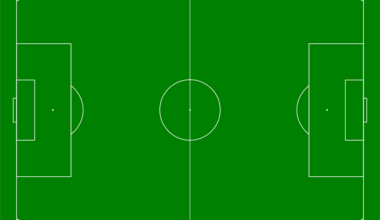Understanding Eating Disorders in Athletes
Athletes are susceptible to eating disorders, stemming from the pressure to perform and maintain specific body types. Disorders such as anorexia nervosa, bulimia nervosa, and binge eating disorder can severely impact health and performance. Awareness and education about these issues are crucial for coaches, trainers, and fellow athletes. Eating disorders can often go unnoticed until significant harm has occurred. Signs to look for include drastic weight changes and preoccupation with food or body image. Furthermore, athletes might exhibit patterns of extreme dieting or excessive exercise. As physical performance relies heavily on optimal nutrition, any distraction caused by an eating disorder can detrimentally impact results. It is essential to foster an environment where athletes feel safe discussing their challenges without fear of stigma. Increasing awareness among athletes creates earlier detection opportunities. Regular screenings should be part of training to assess mental health and nutrition. Affiliating with professionals specialized in athlete psychology can further support recovery and understanding. Awareness programs must be incorporated into coaching education to ensure athletes receive comprehensive support in all aspects of their training and health.
Importance of Screening Tools
Screening tools serve as vital instruments for identifying athletes at risk for eating disorders. They help in early detection and facilitate interventions before problems escalate. The objective is to promote a supportive approach that encourages athletes to seek help gracefully. There are several validated questionnaires available, including the Eating Attitudes Test (EAT-26) and the SCOFF questionnaire, tailored for identifying symptoms of eating disorders. These tools assess attitudes towards food, body image issues, and dieting behaviors. Administering these assessments regularly can instill a culture of care within sports settings. Results provide vital information for coaching staff and medical professionals to address potential problems and recommend necessary interventions. Furthermore, integrating these tools into routine training can minimize stigma, encouraging open discussions on eating habits and changes in body image. It’s important to use these screenings alongside personal conversations that prioritize mental health and well-being. Remember, athletes are humans first, and their self-worth should not be solely tied to performance levels. Proper education on nutrition can significantly reduce the risk of eating disorders, making screening an indispensable tool in sports programs.
In addition to questioning tools, observational methods can provide rich insights into athletes’ behaviors and habits. Coaches and trainers should be trained to recognize signs and symptoms of eating disorders. Attention should be given to unusual behaviors during meals, restrictive eating patterns, and any increase in problematic exercise behaviors. Such observations combined with regular screening can form a comprehensive approach to athlete welfare. Encouraging peer support systems, where teammates can share concerns about one another respectfully, can also play a crucial role in early identification. Athletes often trust each other deeply and may feel more comfortable discussing sensitive issues within that context. Open dialogue surrounding body image and mental health within athletic teams cultivates a safer environment for vulnerability. Training sessions that educate athletes on the importance of nutrition, health, and mental well-being can raise collective awareness and reduce risks. Highlighting the mental aspects of nutrition may influence an athlete’s choices positively, deterring disordered eating behaviors. As organizations continue to innovate on best practices in athlete care, a multi-faceted approach featuring screenings, observations, and peer support grows more critical.
Additionally, enhancing the educational aspect in every sports training framework contributes significantly to managing eating disorders. It is essential to incorporate sessions that focus on the psychological effects of eating disorders not just on the athletes but also on their teams. Education pertaining to nutrition and its role in performance needs to be prioritized. Ensuring athletes understand what good nutrition entails and how it impacts their body health can discourage harmful behaviors. Information on how disordered eating can lead to injuries, burnout, and long-term health issues should be part of the curriculum. Moreover, involving certified nutritionists and sports psychologists in these educational initiatives can provide athletes with professional insights into healthy eating practices. These professionals can facilitate discussions on how societal pressures and media portrayals of athletes can skew body image perceptions. By addressing these topics, a competitive sports culture supportive of holistic health is cultivated, preventing isolation among athletes suffering from eating issues. Awareness, matched with professional guidance, serves as the first line of defense against the emergence of eating disorders and helps to protect athletes’ overall well-being.
Creating a Supportive Environment
Creating a supportive environment remains crucial in tackling eating disorders in athletics. Coaches, teammates, and support staff need to foster an atmosphere that prioritizes athlete wellbeing over performance metrics. Open lines of communication allow athletes to feel comfortable discussing personal struggles. Ensuring that deficiencies in nutritional knowledge do not arise is vital; therefore, ‘Nutrition 101’ sessions catered to athletes should be standard practice. This can include discussing food types, macronutrient requirements, and meal timing around workouts. All educational programs should emphasize the importance of balance rather than restriction. Moreover, integrating mental health professionals within sports teams reinforces the message that seeking help is a strength, not a weakness. Establishing clear policies that promote mental health initiatives ensures that athletes know they are cared for both physically and psychologically. Believing in the balance between sport and mental health cultivates resilience among athletes and encourages them to prioritize their overall health. Effective communication also extends to how coaches talk about body images and weight. Coaches should avoid making remarks that may cause insecurity among athletes about their bodies or performances.
Engaging with Parents and Guardians
Engaging with parents and guardians in discussions around athlete nutrition and mental health creates an additional layer of support. Their involvement often facilitates better understanding and reinforcement of healthy practices in the home environment. Parents should be educated about the signs of eating disorders and encouraged to engage in open discussions with their children. Regular informational workshops can be beneficial for parents, providing them with the tools to support their athlete’s nutrition and emotional wellbeing. Involving families ensures athletes have a secure system encouraging nutritious choices, reinforcing healthy behaviors nurtured in training. Furthermore, parents can be instrumental in promoting positive body image philosophies. Encouraging healthy relationships with food can foster a nurturing environment for athletic pursuits. Parents should also be reminded that discussions around weight should be approached delicately to avoid triggering insecurities. Supportive dialogues are essential for emotional health and help foster resilience. Lastly, parents can advocate for better nutritional policies within teams and encourage schools and sports organizations to invest in mental health resources, benefitting athletes at large. Balancing support from both coaches and families can significantly diminish risks associated with eating disorders.
In conclusion, tackling eating disorders within sports settings demands a collaborative approach involving athletes, coaches, support staff, and families. Screening tools are a powerful step toward early identification, allowing timely interventions that prioritize athletes’ health and performance. Engagement and education are paramount throughout this process, promoting understanding and visibility of these issues. Fostering a supportive culture within athletic environments ensures that discussions surrounding mental health and nutrition are normalized, which can lead to healthier outcomes for athletes. It is crucial to recognize the signs of distress and prioritize mental wellbeing in the pursuit of athletic prowess. Increasing education, open conversations, and proper support systems can prevent the onset of eating disorders, ultimately preserving athletes’ health. Early detection, combined with an emphasis on holistic approaches to training, will significantly shape the future of athlete care. Conversations surrounding the relationship between mental health and performance must continue, as they can ensure that athletes have the necessary resources to thrive both in sports and life.
.





